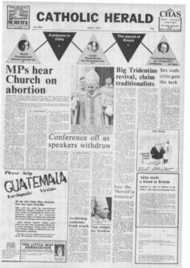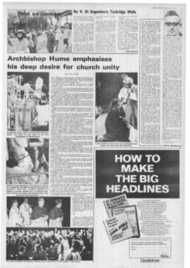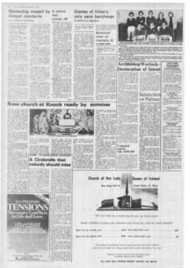Page 4, 2nd April 1976
Page 4

Report an error
Noticed an error on this page?If you've noticed an error in this article please click here to report it.
Tags
Share
Related articles
Writing For The Conversion Of England
Mgr. Benson At Padley
The Infectious Sense Of Fun Behind Hare Street Chapel
New 'life' Of R. H. Benson
In A Few Words
Remarkable prophecies of Mgr R. H. Benson
by Fr J. H. CRE HAN, SJ
MGR Benson's novels were read by many older people when they were boys or girls at school and are now forgotten, but they are coming back now because of the element of prophecy they contain. One prophecy was partially fulfilled the other day when the monks of Ampleforth sang vespers in Westminster Abbey.
When Mr Robert Hugh Benson wrote "The Dawn of All" (1911) he tried to give a picture of \+h,it the state of England would be in 1973. His chiel character, a middle-aged Westminster canon. dozed off in hospital in 1911 and woke tip in 1973, to find that much of his environment had changed.
A young priest offered to take him across to the Abbey to meet the Prior of Westminster, ho lived in Dean's Yard. The Benedictines had taken over the Abbey.
This was the rosy picture of the future which Benson had to write to calm the fears of his devout readers, who had been shocked by his earlier gloomy picture in "Lord of the World", which told of the coming of Anti-christ to Britain. That novel foretold that the only two religious forces left in Britain towards the end of the century would be the Humanists and the Catholic Church.
Anti-christ was accepted by the Government at a monster meeting in Trafalgar Square, at which a benighted Catholic tried to shoot Antichrist; whereupon the Government sent off its bombers to attack the Vatican. The Pope escaped to Nazareth, where he was again bombed in the final act of human existence.
It is in the details of life that this novel was prophetic, Newspapers have withered away, and people read the news as it is flashed in lights along the tops of buildings (as happened not long ago at Waterloo Station). There are motorways about the land, and the Humanists have established a series of hostels to which those troubled in mind can withdraw when they are thinking of suicide.
A staff of pyschiatrists helps them to come to a decision; they sign the necessary papers, and then the operation is carried out for them in peace and tranquillity. Strange to relate, one such hostel was set up not long ago in Sweden! Teilhard was a great admirer of Benson's novels. He wrote from Hastings to a friend that Benson was his favourite author. The rosy picture of the future gave Teilhard his vision of the Omega Point for the Christification of the world.
Ile did not read the gloomy book "Lord of the World" until after the war of 1914-18 was over, and then it repelled him. But during the war, Teilhard wrote three short stories in the manner of Benson, which his French colleagues refused to have printed.
His "Diaries" for the war years, recently published, show that he derived other ideas from Benson: but Teilhard failed to find room in his thinking for Anti-christ and a massive defection from Christ before the end.
It hardly needs to be said that Benson had made his Anti-christ an American, who after being accepted by the Russian people (shades of Helsinki!) proposed to the British Government that he should be welcomed in Britain, and this was accepted as inevitable. It is remarkable that one who was writing in 1907 should have foreseen so much of the future.
blog comments powered by Disqus









